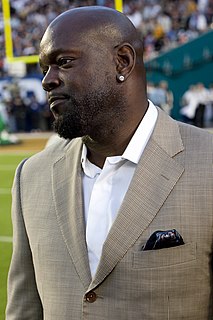A Quote by John Greenleaf Whittier
Leaning on Him, make with reverent meekness His own thy will.
Related Quotes
God is alpha and omega in the great world: endeavor to make him so in the little world; make him thy evening epilogue and thy morning prologue; practice to make him thy last thought at night when thou sleepest, and thy first thought in the morning when thou awakest; so shall thy fancy be sanctified in the night, and thy understanding rectified in the day; so shall thy rest be peaceful, thy labors prosperous, thy life pious, and thy death glorious.
Deliberate long before thou consecrate a friend, and when thy impartial justice concludes him worthy of thy bosom, receive him joyfully, and entertain him wisely; impart thy secrets boldly, and mingle thy thoughts with his: he is thy very self; and use him so; if thou firmly think him faithful, thou makest him so.
When in the wondrous realms above Our Saviour had been called upon, To save our world of sin by love, He said, "Thy will, O Lord, be done.' The Kings of kings left worlds of light, Became the meek and lowly one; In brightest day or darkest night He said, "Thy will, O Lord, be done." No crown of thorns, no cruel cross Could make our great Redeemer shun. He counted his own will but loss, And said, "Thy will, O Lord, be done." We take the bread and cup this day, In memory of the Sinless One, And pray for strength, That we may say, As he, "Thy will, O Lord, be done."
Why prove to a man he is wrong? Is that going to make him like you? Why not let him save face? He didn't ask for your opinion. He didn't want it. Why argue with him? You can't win an argument, because if you lose, you lose it; and if you win it, you lose it. Why? You will feel fine. But what about him? You have made him feel inferior, you hurt his pride, insult his intelligence, his judgment, and his self-respect, and he'll resent your triumph. That will make him strike back, but it will never make him want to change his mind. A man convinced against his will is of the same opinion still.
Beneficence is a duty. He who frequently practices it, and sees his benevolent intentions realized, at length comes really to love him to whom he has done good. When, therefore, it is said, "Thou shalt love thy neighbor as thyself," it is not meant, thou shalt love him first and do him good in consequence of that love, but, thou shalt do good to thy neighbor; and this thy beneficence will engender in thee that love to mankind which is the fulness and consummation of the inclination to do good.
We are trying not so much to make God listen to us as to make ourselves listen to him; we are trying not to persuade God to do what we want, but to find out what he wants us to do. It so often happens that in prayer we are really saying, 'Thy will be changed,' when we ought to be saying, 'Thy will be done.' The first object of prayer is not so much to speak to God as to listen to him.
I discovered early that the hardest thing to overcome is not a physical disability but the mental condition which it induces. The world, I found, has a way of taking a man pretty much at his own rating. If he permits his loss to make him embarrassed and apologetic, he will draw embarrassment from others. But if he gains his own respect, the respect of those around him comes easily.





































